#jlrrt watches
Text
JLRRT’s Favorites
Includes only works that I’ve read, watched or listened to. Some works are out of date or contain errors, but are still included for their enjoyable writing or other strengths. This list will be updated as I find new media I like. Feel free to recommend more to me!
Biographies
Antony and Cleopatra, by Adrian Goldsworthy (review)
Augustus: First Emperor of Rome, by Adrian Goldsworthy (review)
Augustus: The Life of Rome’s First Emperor, by Anthony Everitt (review)
Brutus: The Noble Conspirator, by Kathryn Tempest (review)
Caesar: Life of a Colossus, by Adrian Goldsworthy (review)
A Companion to Julius Caesar, anthology, ed. Miriam Griffin (review)
Julius Caesar and the Roman People, by Robert Morstein-Marx (review #1, review #2)
Cato the Younger: Life and Death at the End of the Roman Republic, by Fred Drogula (review)
Cicero: The Life and Times of Rome’s Greatest Politician, by Anthony Everitt (review)
Clodia Metelli: The Tribune's Sister, by Marilyn Skinner (review)
Fulvia: Playing for Power at the End of the Roman Republic, by Celia Schultz (review)
Marcus Agrippa: Right-hand Man of Caesar Augustus, by Lindsay Powell (review)
Scipio Africanus: Rome’s Greatest General, by Richard Gabriel (review)
Servilia and her Family, by Susan Treggiari (review)
Tiberius Caesar, by David Shotter (review)
Tiberius, by Robin Seager (review)
Classical Sources
Catiline’s War, by Sallust (review)
The Jewish War, by Flavius Josephus
The Twelve Caesars, by Suetonius (review and discussion; see also my Suetonius tag)
Other Nonfiction
A Companion to the Roman Republic, eds. Nathan Rosenstein and Robert Morstein-Marx
The Last Generation of the Roman Republic, by Erich Gruen (review)
Latin for All Occasions and X-Treme Latin by Henry Beard
Horrible Histories: The Rotten Romans, by Terry Deary (middle grade audience)
Roman Homosexuality, by Craig Williams (review, chapter summaries)
SPQR: A History of Ancient Rome, by Mary Beard (review, timeline from the book)
The Storm Before the Storm, by Mike Duncan (review)
Comics
Cardinal's art and comics on Tumblr
The Cartoon History of the Universe series, by Larry Gonick (graphic novel; Roman history starts in Volume II; review)
The Dead Romans Society on Tumblr
Historical Fiction Books
Augustus, by John Williams (review)
The Cicero Trilogy (Imperium, Lustrum, Dictator), by Robert Harris (review)
The City War, by Sam Starbuck (review)
Cleopatra: Daughter of the Nile, by Kristiana Gregory (middle grade audience; review)
Masters of Rome series, by Colleen McCullough (review)
Roma soy yo, by Santiago Posteguillo (review)
Roma Sub Rosa series, by Steven Saylor (review, suggested reading order)
Podcasts
The History of Rome by Mike Duncan
TV, movies, videos
Fulvia y Cleopatra, dos destinos cruzados - Spanish docudrama (review)
A Funny Thing Happened on the Way to the Forum
Hannibal’s March on Rome, Smithsonian Channel
Historia Civilis Youtube Channel
Invicta Youtube Channel
I, Claudius, BBC
Last Days of Pompeii, Amazon Prime Documentary
Meet the Romans with Mary Beard
Murder in Rome, BBC Timewatch
Overly Sarcastic Productions Youtube Channel
Rome: Empire Without Limit with Mary Beard
Plays
The Tragedy of Julius Caesar by William Shakespeare
See also:
Things I look for in history books - my tips for evaluating whether a book is reliable
Disability studies for ancient Greece and Rome
White supremacy, racism, and decolonizing classics studies
Women in Classical Antiquity (list of scholarly sources)
Queer Classics: A Speculative Reading List
LGBT Meets SPQR
Lesbiantiquity: "A zine-anthology of Greek & Latin writings about women loving women"
Resources for learning about Black history
81 notes
·
View notes
Text
youtube
So, I finally got around to watching @theabigailthorn's video on Stoicism, and I really enjoyed it! It's a good introduction, both to the strengths of Stoic philosophy, and to its limitations and modern criticisms.
I especially liked that she pointed out ancient Stoicism did not reject all emotions as bad, which is a common misconception. It was also cool to see her touch on Stoic physics, which are usually overlooked, but can get very weird and cool! Most Stoics were what we'd now call pantheists, and some believed in ekpyrosis, the idea that the universe is one giant time-loop repeating forever.
Stoicism was a big hit in the Roman world, and a lot of Roman politicians agreed with or rejected Stoic ideas. (Cato the Younger probably wasn't a Stoic, though; see Fred Drogula's biography of him for details.) And through the Romans and Greeks, several Stoic ideas seeped into Christianity. Besides the ones Thorn points out, the Christian ideas of the "conscience," of all humans being equal in nature, part of one worldwide community, and of having part of God/Nature within us, all have precedents in Stoicism. But the pantheism in Stoic physics, and the belief in ekpyrosis instead of a final judgment day, made it an unacceptably "pagan" worldview in the eyes of later Christians.
Anyway, super cool topic, and I love how Thorn makes philosophy interesting and approachable. Maybe in a few years we'll have an Epicurean moment, too...
#personally i lean more toward epicureanism + a social justicey/feminist flair#but stoicism also inspired some big improvements in mental health care in the 60s and 70s#so that's neat too!#stoicism#philosophytube#jlrrt speaks#jlrrt watches#jlrrt essays
24 notes
·
View notes
Text
Y’all. I just saw the Smithsonian documentary Hannibal’s March on Rome. And I LOVE IT.
Do you want to see an elephant actually cross the Alps (and be totally fine don’t worry)? Do you want to watch a band of Germans attempt to build fifteen tons of Elephant Dirt Raft and float it across a river like an extremely nerdy Top Gear stunt? Do you want to get personally invested one British man’s search for 2200-year-old horse poop?
They made military logistics exciting. The film is a great mix of history, archaeology, engineering and microbiology. Beautiful scenery, acting, and sets, too. It’s a great starting point to learn about Hannibal, and it treats the Carthaginians and their allies as real people, not “barbarians.” And it seems almost completely accurate; the only incorrect bit I spotted was the myth about Rome salting Carthage’s fields.
At 44 minutes, they had to skip over a lot of things, like most of Scipio Africanus’ campaigns and the Carthaginian politics that hampered Hannibal’s efforts. But for what time they had, it’s very, very good.
#hannibal of carthage#smithsonian#ancient Rome#carthage#documentary#jlrrt speaks#punic wars#jlrrt essays#jlrrt watches
44 notes
·
View notes
Text
So I just saw the first episode of Imperium: Augustus.
Thanks to the terrible interface for Amazon Prime, which also renamed the show and put it next to the documentaries, my family and I mistook this for a documentary until it was too late. And that’s unfortunate, because if you go in expecting historical accuracy you’re gonna be frustrated.
You may enjoy it if you just want to watch a fun drama set in ancient Rome. It’s cool to see most of the characters played by actual Italians, and Agrippa and Maecenas get the prominent roles they deserve. Livia even states at one point that Augustus “loved [Agrippa] more than any woman.”
I do wish they hadn’t made Maecenas’ sexuality a joke. He’s a stereotypical effeminate queer here, rather than a full character who happens to be queer, likes the arts, and makes jokes sometimes. And I don’t like that they portrayed Livia as a cold-blooded murderess. Most of the other inaccuracies can be excused for drama purposes, but those bits bug me.
That said, the show did make me laugh several times:
At one point Augustus says Julia has given him “two wonderful grandsons.” Which becomes a subtle diss if you know that Julia had three sons, and the third, Agrippa Postumus, was a Huge Disappointment and never appears in the show. He was so bad they wrote him out!
Octavian saves Livia from a gang of thugs when they’re teenagers, and she starts flirting with him until she hears he’s Caesar’s nephew, whereupon she slams the door in his face.
Caesar: “You’re ill, you shouldn’t shovel a trench with the soldiers.” Octavian: “No! I want to!” [He grabs a shovel. Scene immediately cuts to Octavian passed out in a tent.]
Caesar directs Octavian’s attention to a view of Rome from the balcony, a vista that is very obviously a painting.
Caesar gets murdered in the Curia Julia, which A) has his name on it and B) did not exist at this time.
Decimus Brutus is a murderer of Caesar, enemy of Antony and critical to the plot after Caesar’s death, yet never appears onscreen. He’s a ghost!
Maecenas: “The three of us will rule the world. Octavius is the politician. Agrippa is the soldier.” Agrippa: “And what are you?” Maecenas: “I’m the mouth.” [wiggles eyebrows]
Honestly, everything Maecenas says and does is hilarious, even if he is a stereotype. At one point he’s interrupted while shaving his legs and gives Octavian first aid while in only a loincloth. Even better when you know this was a (probably false) accusation lobbed at Octavian.
Octavian skips the complex five-way political maneuvering in 44-43 BCE by straight-up bringing the Macedonian legion into the Senate house and forcing them to make him consul. Yes, the whole legion. It is never explained where the legion came from.
Caesar’s plan at the battle of Munda is apparently “charge Sextus Pompeius’ fort.” No artillery, no tactical plans, nothing. The first line of troops is immediately slaughtered by a rain of arrows from the defenders and we get a rather awkward shot of the second line of legions staring at a field full of the dead. Caesar reacts by removing his helmet, charging the fort himself, and making everyone follow head-on again. The Pompeians, for no apparent reason, leave their highly advantageous fort and get slaughtered.
Anyway, the show isn’t what I’m looking for, but if you just want a good drama (or enjoy poking fun at inaccuracies) you may like it.
#imperium augustus#octavian#livia#julius caesar#historical drama#homophobia mention#jlrrt speaks#jlrrt watches
51 notes
·
View notes
Note
I don't know if you ever watch melodramatic docudramas, but I read that you know Spanish and there is this Spanish documentary about Fulvia (and Cleopatra) that might interest you https://www.youtube.com/watch?v=4lrSwC-NOlY&t=2429s
!!! Fulvia! ¡Me encanta! (Also love Cleo too, but it's so hard to find Fulvia content!) I watched the video and got mad when I realized it was only the first half of the show! Which is remarkable, because this thing is...it's something!
Fulvia's actress has so much poise and gravitas, I'm pretty sure if I weren't aroace I'd have a crush. She looks even better splattered with blood. <3
Clodius has the personality of cardboard, and I feel so bad for the actor because it's clearly the director's fault for not letting him ham it up in drag or punch dudes in the face. Let! Him! Sashay!!
44-year-old Cicero is portrayed as an old bearded fart yelling at clouds.
When they cut to a painting of the curia burning down so they didn't have to set the model on fire...
After said fire, and Clodius' solemn funeral, we immediately cut to...Julius Caesar, in the form of a slutty theater puppet. It's terrifying and hilarious.
Cleopatra steals every scene she's in. As she should. At one point Cicero picks up one of her scrolls and she's like "That's a book on contraceptives, want a copy?" and the narrator says, deadpan, "Cicero did not enjoy meeting the queen."
The intense 10-second gaze between Fulvia and Cleopatra is more sexually charged than every actual couple in the show.
Did I mention all this is presented by Santiago Posteguillo? The novelist? Alongside actual historians, but still funny.
Curio has apparently been yeeted from history altogether.
Several factual errors - Cicero was a witness at the Bona Deal trial, not a prosecutor; the populares and optimates were not political parties; Clodius was killed in a gang fight, not one-on-one; Roman women could own property and have praenomina, though the latter was rare in Fulvia's time; and Cleopatra first met Caesar in Egypt, not Rome.
I wouldn't recommend it for accuracy, but I would absolutely recommend it if you speak Spanish and like seeing scary women covered in blood. Be warned that it depicts animal death and graphic violence, too.
I'm absolutely going to be looking for the second half of this incredible...something. But even if I can't, I'm immediately adding this to my favorites list. Thank you, for whatever the hell I just watched.
#wolframpant#fulvia#documentary#cleopatra#docudrama#jlrrt watches#just roman asks#santiago posteguillo#fulvia y cleopatra:dos destinos cruzados
11 notes
·
View notes
Text
My favorite characters in this film are the side roles that are internally screaming at Antony, Cleopatra and Octavian’s questionable judgments:
Rufio: Don’t you think the boat with pink perfume and scantily clad women might be an attempt to seduce--
Antony: Negotiations are GO baby!
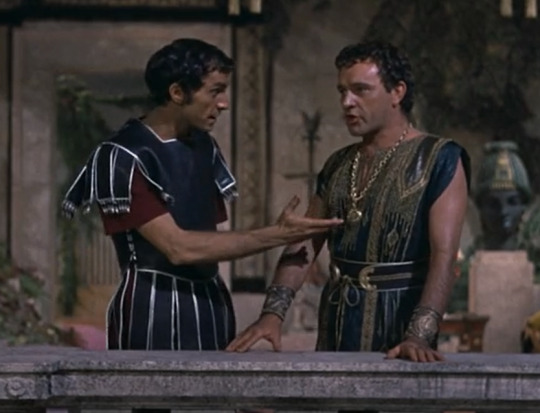
Octavian: Hey, I know your husband only died six months ago, but what if...you and Antony...
Octavia: Little brother, I love you, but if you don’t shut up I will stick a gladius in your spleen.

And yep, Octavian is absolutely coded as either gay or asexual here. It’s mainly in the actor’s intonation and mannerisms. Agrippa’s here too, though the filmmakers decided to make him one of Caesar’s generals instead of Octavian’s childhood friend.

But my favorite thing is that two hours in, the filmmakers have skipped everything that would make Octavian actually villainous: the proscriptions, the betrayal of Cicero, the torture of Brutus and Cassius’ men, and whatever the hell happened at Perusia. But they kept several of Antony’s insults to Octavian. So if you don’t know history it just looks like Antony bullying a random blond twink.
29 notes
·
View notes
Text
Just saw the first episode of Domina, and that is some damn fine writing.

The characterization is especially strong. I very quickly sympathized with Livia, Antigone, and Livius; Octavian and Agrippa are delightfully terrifying; and yet Tiberius Claudius Nero manages to be more repulsive by dint of how personal his cowardice, treachery and abuse are. I especially love how they demonstrated Livia’s courage, resourcefulness and cleverness, and Antigone’s compassion and integrity are beacon of light.
The show isn’t 100% accurate - I’m pretty sure Agrippa’s Pantheon shows up in the background about 12 years before it was built - but frankly, I love Livia and Antigone enough not to care.
I did have to skip one of the sex scenes, so I’m not sure if I’ll be able to watch the whole series. The show does include rape and bloody violence. But I really want to see where this goes and I’m excited for the next episode.
28 notes
·
View notes
Text
No one in this movie has any chill at all.
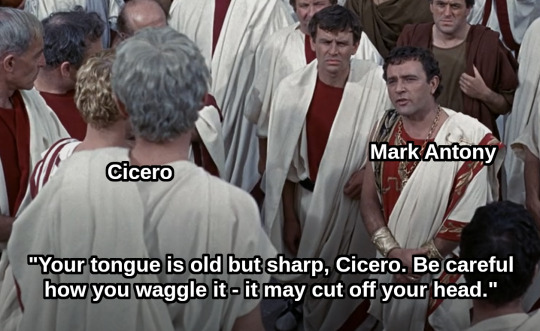
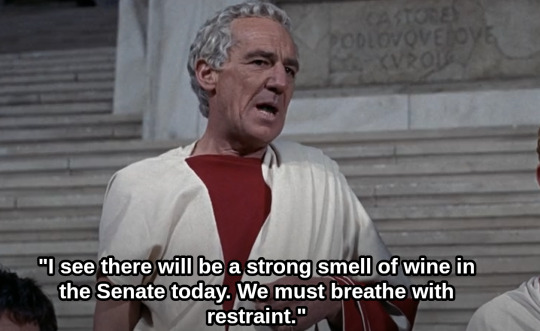
I am 95% sure Antony is offering to set up Octavian on a gay date here.

Silly Antony, he’s already committed to Agrippa!
Okay, all kidding aside, Antony really did make mean-spirited jokes (and accusations) about Octavian’s sexuality. And I strongly suspect something was going on between Octavian and Agrippa, though we’ll never know if it was platonic or not.
I’ve heard this version of Octavian is somewhat distorted to be more effeminate than he really was, since he’s the antagonist and thus vilified. And y’all know how villains were often queer-coded in 1963. Perhaps I should be offended, but I’m more curious than anything else.
40 notes
·
View notes
Text
I like to imagine Mark Antony goes grocery shopping like this.
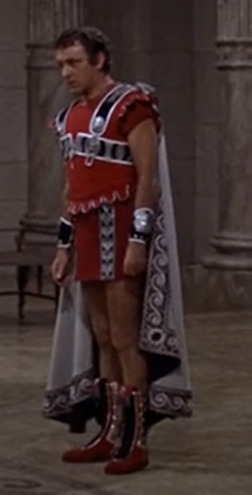
#the costumes in this movie are fucking incredible#cleopatra 1963#mark antony#jlrrt speaks#jlrrt watches
25 notes
·
View notes
Text
Just rewatched Lawrence of Arabia (1962). It's rather dated now, since only one of the Arab characters is played by an actual Arab, and the portrayal of Bedouin culture is quite stereotyped. (Many Arab countries found it offensive.) But it was progressive for its time, with nuanced portrayals of individual Arabs, a critique of European imperialism, a massive subversion of the "white savior" trope, sympathetic depictions of trauma and mental illness, and a positive interracial gay relationship(!). And the writing, music, acting and cinematography are excellent.
Of course, it got me thinking about Romans again.
Or, more precisely, what I find interesting about the Romans. It's not the size or power of the empire; it's not the gleaming marble temples; it certainly isn't the violence, slavery or oppression. It's the struggle of ordinary people trying to hold onto their humanity, and making difficult moral choices, in a brutal and unfair world.
In Lawrence of Arabia we see a brave, kind and idealistic man get broken by social forces much bigger than himself. The trauma he endures, the brutal necessities of war, political maneuvering, and his loneliness and alienation as a gay man in 1916 - not only does he fail, but he does much worse things than he ever expected, losing the "moral battle" as well. Ultimately, he begs to be removed from his mission in Arabia out of horror at his own actions.
I can't help but wonder how many people in the ancient Mediterranean were in a similar position. The Roman republic, for instance, was at war almost every year of its existence, and its neighbors were similarly brutal.
I suspect judging others is a natural human instinct. But it isn't always the most informative response. I don't want merely to judge people, I want to understand why they do good or bad things. You cannot fight evil without understanding it. You can't understand someone without treating them as human. What social forces and circumstances pushed this person in this direction? What choices and opportunities were open to them? How could we make the world a little better, so this is less likely to happen again?
My interest, as a history geek, is not to excuse the Romans (or war criminals) for what they did wrong, but to understand them as people like ourselves. It's only by understanding the past that we'll be able to learn from it.
#if you're thinking 'but what about X extremist person/group here'#this post is not about that#this post is about me examining my own reactions to historical figures#and also a really good movie#lawrence of arabia#jlrrt speaks#jlrrt watches#jlrrt essays
20 notes
·
View notes
Text
I’m really enjoying Rome: Empire Without Limit, presented by famed classicist and unrepentant nerd Mary Beard. I’m only 2/4 episodes in, but I love how she emphasizes the empire’s multicultural makeup without glorifying imperialism.
The first episode was mostly stuff I knew about Rome’s legendary origins, but I was intrigued by her argument that Rome’s habit of creating socii made their bigger conquests possible. Socii were allied peoples who retained self-government, most of their territory, and usually didn’t have to pay tribute, but they did have to provide auxiliary troops for Rome’s wars. Socii also got a share of war booty and protection from foreign threats. You might call it “defeat means friendship” or an “extortion racket,” depending on how charitable you feel.
This apparently created a snowball effect where Rome’s military capacity got bigger and bigger. It’s why they could lose several fleets of ships in the First Punic War and keep going. Not on purpose - the Carthaginians kept beating them - but Rome just kept finding more men and building more boats. We hear a lot about “Roman tenacity,” but I suspect at least as much credit needs to go to Rome’s non-Roman allies, and to the treaty system that made this possible.
The second episode really brings home how multiethnic and cosmopolitan the empire was. I loved the stories of the Palmyrene (Syrian) soldier who settled down with a Celtic wife, the Algerian villager who became governor of Britain, and the movement of Iberians, Greeks, Polish people, etc. all over the place. The Romans exported their culture everywhere, but were also heavily influenced by the cultures they conquered, and most Roman colonies were a syncretic mix instead of outright rejecting the local customs. Even top government officials and emperors could come from many ethnicities.
That’s not to say it was a fair system, oh no. We’re still talking about imperialism here! The Romans were very good at playing native peoples against each other (like Caesar did in Gaul) and exploiting class differences (like giving all the rich people citizenship to cut off potential rebellions). And they could still be xenophobic and oppressive. The Social War of 91 BCE was just one example of socii being really displeased with how the system worked.
Even so, it’s worth pointing out what form of imperialism the Romans practiced. Because racists love to pretend Rome was just a bunch of white people who defeated the “barbarians” by being smarter. In reality, the Roman empire was not only multicultural, but could not have been formed without multiculturalism. Rome never would’ve gotten out of Latium if they had rejected and tried to wipe out their neighbors instead of bringing them into the fold.
Favorite statistic from episode two: about 20-30% of urban Romans in Britain weren’t even born there! Compare that to medieval times, when most people never moved more than 10 miles from where they were born, and that’s incredible! It makes me wonder if Latin became deeply entrenched not just because it was the prestige language, but because so many people were moving around western Europe that it was just easier for most people to learn a bit of it to get by. Especially in the cities.
Anyway, great series so far. I’m excited to see the next two episodes!
17 notes
·
View notes
Text
Elizabeth Taylor has a lot of great Looks but my favorite so far is “mad, fab, and ready to stab.”
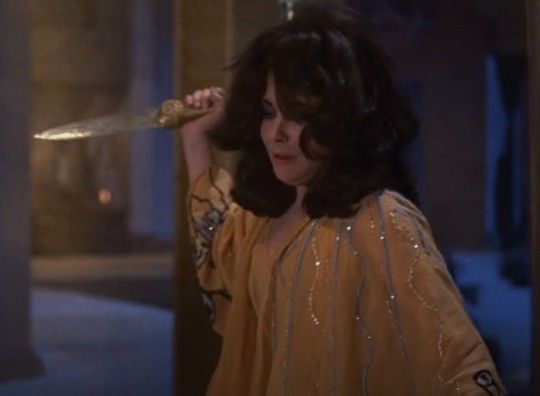
She follows this up by screaming “ANTONY” in a screen-shattering rage because he married Octavian’s sister. My girl...she’s so valid.
#cleopatra 1963#elizabeth taylor#all the actors are good but she's fuckin' A++#jlrrt speaks#jlrrt watches
23 notes
·
View notes
Text
Shout-out to the documentary about the Second Punic War that:
Erased the existence of the First Punic War.
Suggested Lebanon was a colony of Carthage.
Accidentally implied the Battle of Zama took place in Italy thanks to poor editing cuts.
Portrayed Scipio as a savage musclehead instead of winning through diplomacy, strategy, and logistics.
Erased the entire third front of the war in Greece. (AKA the First Macedonian War.)
Claimed the Romans committed genocide in Spain at this time, when the cornerstone of Scipio’s strategy was actually building alliances with indigenous people who hated Carthaginian rule, and his contemporaries criticized him for refusing to destroy Carthage itself.
It’s part of a series called Eight Days That Made Rome, and I won’t be watching further episodes.
#i did not think i'd be defending scipio africanus of all people today#he's not perfect but he was arguably one of rome's least brutal generals#punic wars#scipio africanus#hannibal of carthage#jlrrt watches#ancient rome
16 notes
·
View notes
Text
Still watching Cleopatra (1963). There is a nude Elizabeth Taylor getting massaged but all my asexual ass can focus on is the gal raking water in the background.

Who is she (he? they??)? Is that a rake or squeegee or what? Where did the filmmakers get the idea to do this?
11 notes
·
View notes
Text
Just finished Rome: Empire Without Limit, a 4-part TV series with Mary Beard!
The final episode focuses on the Roman empire's decline. At 60 minutes, there's no way she could have thoroughly addressed every factor that went into it, but it was accurate and interesting. About half the runtime was focused on the rise and spread of Christianity, which was...not the choice I would've made, but it's probably what most viewers would want to see. Still informative, entertaining and worth a watch!
I especially like that she also discussed the eastern empire, and its longevity to 1453, nearly a thousand years after most people assume Rome "fell." Beard rightly points out that the Roman empire was not "destroyed by barbarian hordes," but that the invaders more often than not tried to model themselves after Rome and employ Roman culture to build a sense of their legitimacy. There was no effort to wipe out the Latin language or other markers of cultural genocide. It's more like...Rome gradually lost the ability to exert force far from the capital, so power became decentralized, whether due to invasion or regions simply breaking away.
I appreciate that Beard doesn't equate the rise of Christianity with the "fall" (or improvement) of Rome. Christianity was certainly a cultural and political change, but changing religions doesn't necessarily make a state stronger or weaker. However, the adoption of a religion by the government can definitely change the religion, and I wish Beard went into that more. The early Christianities that honored charity, egalitarianism, universal brotherhood, and mostly appealed to women and slaves, were very different from the "state Christianity" that politicians used to develop alliances, define enemy targets, and enforce the allegiance of the populace to the ruling powers via praying to the state's god.
Personally, I think that giving a religion political influence damages both the state and the religion, because it attracts religious leaders more interested in power than in sincere personal practice. And I suspect that happened to Roman Christianity at some point. But I'm no expert - do chime in if you know more about this topic than I.
I would've liked to have seen more exploration of secular reasons for why the Roman empire...disintegrated is probably more accurate than "fell." There's a lot of factors, of course, but I think the show could've spared a few minutes each for inflation, plagues, reliance on mercenary armies, and sheer random bad luck.
However! I recently got a copy of Beard's SPQR: A History of Ancient Rome, and I bet it will go into more detail. I really like her approach to diversity and class in the series I've watched, so I may read this after finishing Gruen's book.
#jlrrt speaks#mary beard#rome: empire without limit#ancient rome#jlrrt watches#history of christianity
12 notes
·
View notes
Text
Hmm episode 2 of HBO’s Rome seems to be based on the “prosecution hypothesis” - the idea that Caesar had to preserve his legal immunity by hopping immediately from proconsul to consul, or else face prosecution “for his crimes” by the Catonians.
I believe the prosecution hypothesis has since been discredited, since no contemporary sources mention it and Caesar actually offered to stand for election in person (thus giving up legal immunity), but it may not have been discredited at the time this show was made. It’s nice that they mentioned the Illyria compromise Caesar proposed. You can tell the creators did their research, even if they made Questionable changes to the facts sometimes.
Also, more gratuitous sex scenes. So far my least favorite character is the director.
9 notes
·
View notes